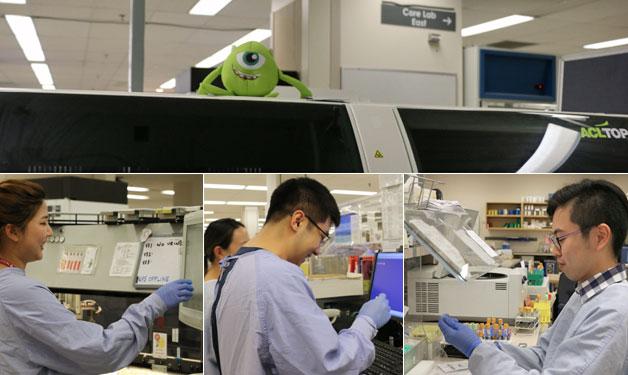
At the heart of Vancouver General Hospital the Core Lab buzzes with activity.
At some point, most patients need to give a blood, saliva, urine or other bodily fluid sample for testing. Where do these samples go and what happens to them?
The Core Lab at Vancouver General Hospital (VGH) is where your sample may potentially end up if you give it to one of the many hospitals or clinics in the Lower Mainland. This diagnostic lab is a beehive of activity at the centre of the hospital. It’s where medical technologists and lab assistants work to efficiently and accurately process the huge volume of samples that come in each day.
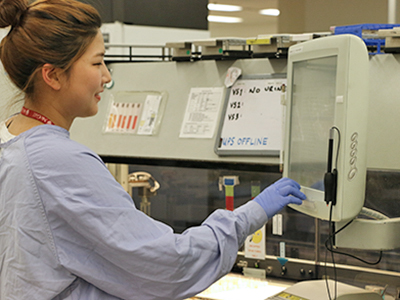
“We have about 80 staff working in here at any given time,” explains Romy Chan, Technical Support Coordinator in the Department of Pathology and Laboratory Medicine. “Many shifts start at six a.m. so that the lab can support early-morning sample collections and diagnoses, and assist with patient discharges.” The early start means lab staff can help doctors diagnose patients more quickly—and get them home sooner.
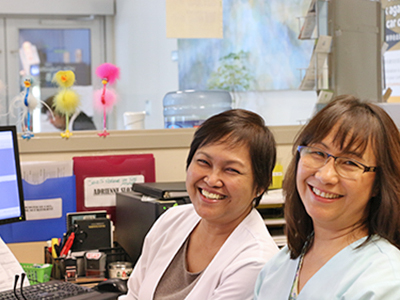
Right after a patient gives a body fluid sample, the sample begins its journey to the Core Lab. At VGH, special couriers—called “runners”—may pick up and deliver samples to the Core Lab, working as quickly as possible. Other samples, such as those collected at the outpatient laboratory in the Gordon and Leslie Diamond Health Care Centre and other nearby buildings, are actually sent in special containers though a pressurized tube system that connects these buildings to the Core Lab.
The samples need to be delivered quickly to not only ensure the prompt discharge of patients, but because some samples may be unsuitable for analysis in as little as 30 minutes. Once the samples arrive at the Core Lab, a special “dispatcher” processes and assigns them to different groups by priority.
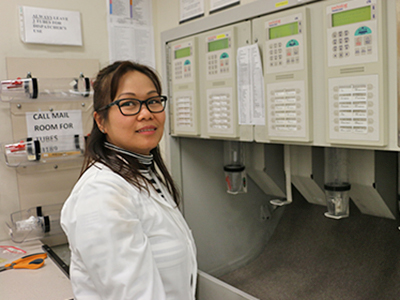
Samples designated as “super STAT” typically come from the emergency department, intensive care unit, or from pre-admission (for patients going to surgery) and will be processed within one hour. Less urgent samples, such as those used for research, are designated as “routine” and will be processed ASAP and most results are available within 24 hours. Once designated, the samples are assigned to different lab staff who work to process and analyze them.
In addition to diagnosing patients and supporting the everyday hospital function of VGH, the lab also supports research. “We support both clinical trials and in-house studies,” explains Dr. Sophia Wong, Medical Biochemist. “In-house means a clinician here at the hospital has a research question and wants to initiate a study, such as trying to implement a new technology, begin a pilot project, or perhaps try something new they’ve seen in a medical journal.”
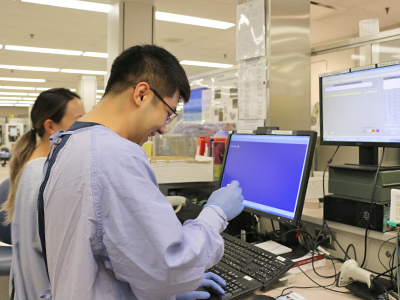
The Core Lab is also a teaching lab where trainees, residents and medical students can learn the everyday lab procedures and how to use specialized equipment. To ensure the accuracy of results, quality control checks take place multiple times per day on every instrument. The lab has some of the most stringent quality control standards of any area of the hospital. Despite this, the atmosphere in the lab is cooperative, fun and supportive.
Though you won’t see the Core Lab staff when you visit the hospital or give a sample, their diligence keeps the entire hospital at VGH running smoothly and supporting innovation.


